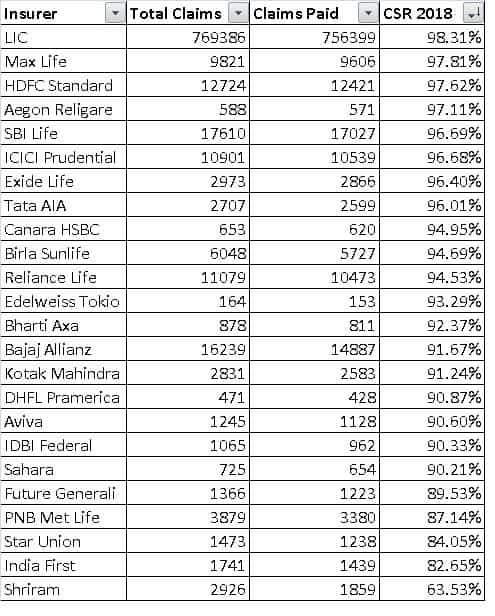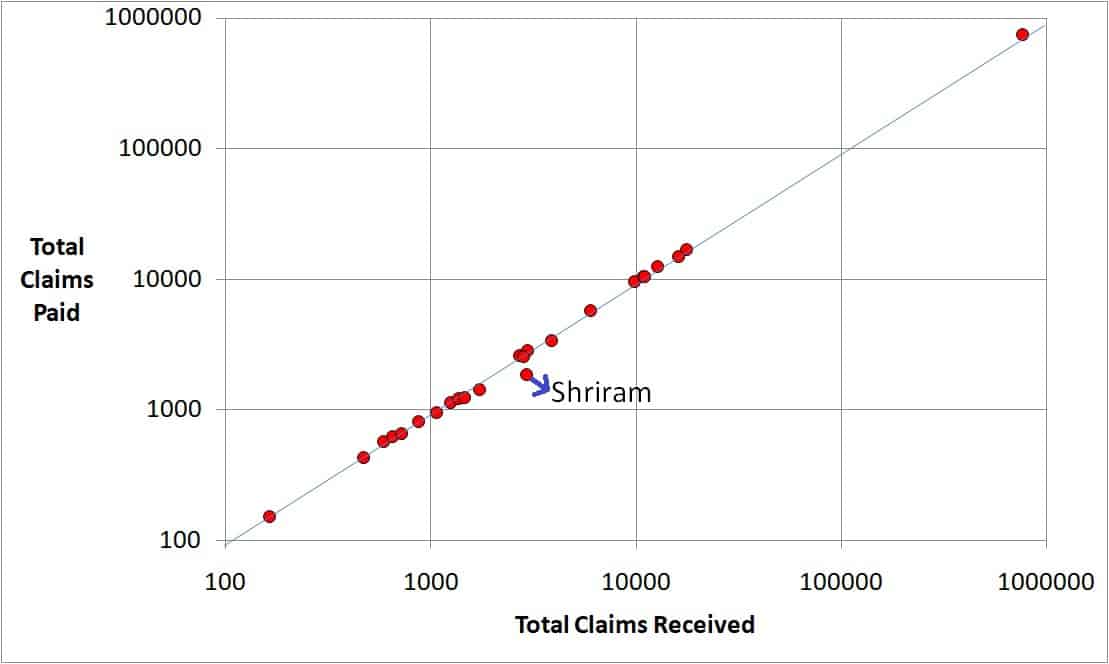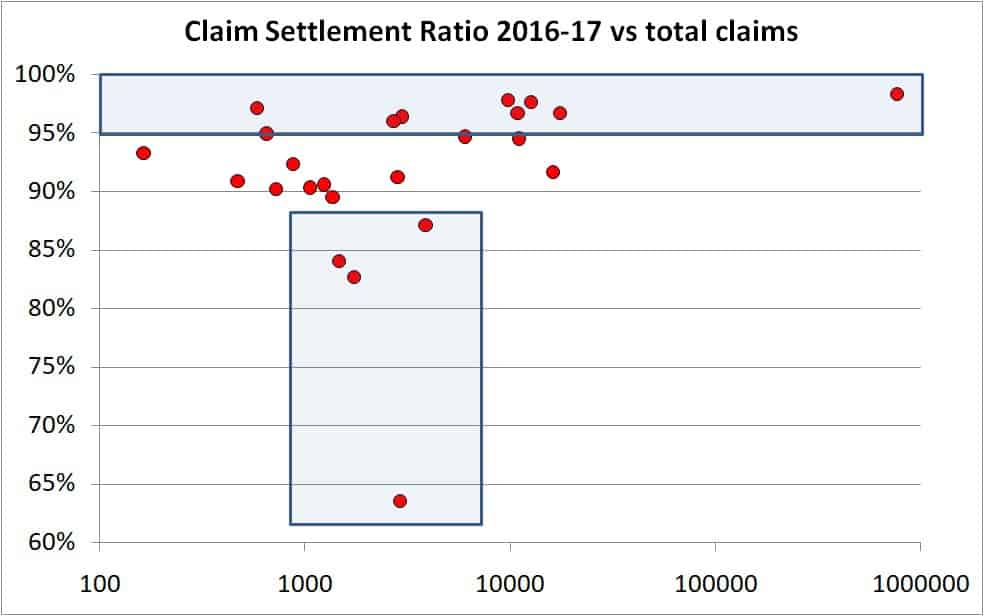Last Updated on October 1, 2023 at 4:48 pm
Claim settlement ratios (CSR) published by IRDA do not represent the probability of claim acceptance. Most private insurers have a claim settlement ratio comparable to that of LIC. Therefore the CSR will not help you choose a term life insurance policy. At best, CSRs would help you reject a few insurers. Here are some insights from IRDAs Annual report 2016-17.
The claim settlement ratio should have never been a criterion for selecting term insurance policy because there is zero evidence to support it Thanks to irresponsible bloggers and reporters, it became popular. Search for “claim settlement ratio” in Google today and the first link’s title is: “Claim Settlement Ratio for Term Insurance by IRDAI”. Google may be using AI, but it is still an algorithm. Who will educate it that IRDA does not differentiate between CSR of pure term life insurance and investment-mixed policies which are still extremely popular?
Suppose insurance company A pays 428 out of 471 death claims, its CSR would be 90.9% and if company B pays 2599 out of 2707 death claims, its CSR would be 96%
- We have no idea what kind of policies were involved.
- We do not know the breakup of sum insured
- We don’t know why the claims were rejected – for all we know they could fraudulent claims. Please don’t tell me everyone applies honestly
- We do not know how the deaths occurred – death claims are fairly straightforward, but still there are exclusions.
- The burden of proving fraud rests with the insurer and if there is a delay on the part of the nominee it will pull down the CSR
If you see a blog post that says company A has CSR ~ 91% and B has CSR ~ 96%, will you conclude that B is better than A because 95% is better than 91% right?
Join 32,000+ readers and get free money management solutions delivered to your inbox! Subscribe to get posts via email! (Link takes you to our email sign-up form)
🔥Want to create a complete financial plan? Learn goal-based investing? Exclusive access to our DIY tools? Increase your income with your skills? Enjoy massive discounts on our robo-advisory tool & courses! 🔥
We have this tendency to assume that only the insured are the victims and if a claim is denied the insurer is a cheat. There is again no data to support this. If there are genuine claims, there will be genuine claim rejections. The claim settlement ratio does not differentiate between rightful rejection and a wrongful rejection (which can be appealed against).
I don’t see how there is any logical way to choose B over A. The difference is not significant. A couple of years from now, A could have a higher CSR than the present. You could buy from B today and next year, it could fold and merge with A!
If you have made an honest application (!) then a difference between a 98% CSR and 90% CSR is meaningless.
Why do people look at the claim settlement ratio?
1. They either cannot afford LIC or do not wish to “waste money”. LIC has the highest CSR right? Why are you then looking elsewhere Mr. logical? Please don’t say balance cost with peace of mind – the data does not help in that.
2. Making a choice is hard. If we shop at Amazon and see 400 reviews with an overall 3-4 star rating, it means many have had a good experience with the product. Even though some people think one-star = 1st rank or give that rating for delivery or payment problems, we assume most of the good experiences are proof that the product is good. Nothing wrong with this, after all, right from school we want “solves examples”.So people want some ratification of their choice. some social proof.
Unfortunately, only a nominee or a ghost can tell you “how good a term insurance plan” was. Since this information is not available, we look at claim settlement ratios – something is better than nothing, no? Well, not if it is wrong.
The lack of confidence in making a choice leads us to take baseless reasoning seriously. Thankfully CSR based logic is en route to a peaceful death. Bloggers will continue to write nonsense with it though because people search google for such nonsense.
Using the claim settlement ratio to select a term insurance policy
Let us ignore all that written above and try to use the claim settlement ratio to select a term insurance policy.
1. Download the IDRA annual report in PDF form.
2. Go to page 160 and rotate the page clockwise by 90 degrees
3. Copy paste the table into notepad first and then onto Excel. With a little bit of formatting, you can get this table.
 Download IRDA Claim settlement data 2016-2017
Download IRDA Claim settlement data 2016-2017
Death claims paid vs total claims
It is clear that LIC has the lions share of the market. The total claims received by all the private players in 2016-2017 is only about 14% of what LIC received. Therefore LIC rejected twice as many claims as the privates did (sounds bad when put that way, is it not?!).
As the private insurers gain market share, you can expect them to move up that line as I have already shown here: How to choose a term life insurance provider in 30 minutes!
Also see more analysis about CSR and IRDA annual report data here: How to Buy a Term Life Insurance Policy If you study past annual reports, the privates have steadily received more and more claims, therefore paid more claims and therefore their CSR has improved. In the current report, only one play: Shriram Insurance is off that line and its CSR is the lowest: 65.33%. It began operations in 2006 and by now should have had a CSR close to the 90s. – not a good sign.
Claim Settlement Ratio vs Death Claims
It will take years for them to reach LIC’s market share (or never!). Consider this: LIC has rejected 12,987 policies this year for a CSR of 98.31%. Even if the rejection doubled, its CSR would only fall by 1.7%. That is the benefit of having a huge denominator.
Even if you want an elitist 95% (again a meaningless boundary) and above CSR, you will still find almost 10 players in that window. So among them, you will always have to do an inky, pinky ponky.
Let us face it, claim settlement ratio will not help you choose a life insurance policy. At best you can use it to eliminate the three insurers with less than 85% CSR. It should have never been a factor in the first place and I am delighted that it will not help in any major way.
Ultimately it is down to your personal comfort level and how much you count costs. Tough luck! You will have to make a choice on your own!
🔥Enjoy massive discounts on our courses, robo-advisory tool and exclusive investor circle! 🔥& join our community of 7000+ users!
Use our Robo-advisory Tool for a start-to-finish financial plan! ⇐ More than 2,500 investors and advisors use this!
Track your mutual funds and stock investments with this Google Sheet!
We also publish monthly equity mutual funds, debt and hybrid mutual funds, index funds and ETF screeners and momentum, low-volatility stock screeners.





- Do you have a comment about the above article? Reach out to us on Twitter: @freefincal or @pattufreefincal
- Have a question? Subscribe to our newsletter using the form below.
- Hit 'reply' to any email from us! We do not offer personalized investment advice. We can write a detailed article without mentioning your name if you have a generic question.
Join 32,000+ readers and get free money management solutions delivered to your inbox! Subscribe to get posts via email! (Link takes you to our email sign-up form)
About The Author
 Dr M. Pattabiraman(PhD) is the founder, managing editor and primary author of freefincal. He is an associate professor at the Indian Institute of Technology, Madras. He has over ten years of experience publishing news analysis, research and financial product development. Connect with him via Twitter(X), Linkedin, or YouTube. Pattabiraman has co-authored three print books: (1) You can be rich too with goal-based investing (CNBC TV18) for DIY investors. (2) Gamechanger for young earners. (3) Chinchu Gets a Superpower! for kids. He has also written seven other free e-books on various money management topics. He is a patron and co-founder of “Fee-only India,” an organisation promoting unbiased, commission-free investment advice.
Dr M. Pattabiraman(PhD) is the founder, managing editor and primary author of freefincal. He is an associate professor at the Indian Institute of Technology, Madras. He has over ten years of experience publishing news analysis, research and financial product development. Connect with him via Twitter(X), Linkedin, or YouTube. Pattabiraman has co-authored three print books: (1) You can be rich too with goal-based investing (CNBC TV18) for DIY investors. (2) Gamechanger for young earners. (3) Chinchu Gets a Superpower! for kids. He has also written seven other free e-books on various money management topics. He is a patron and co-founder of “Fee-only India,” an organisation promoting unbiased, commission-free investment advice.Our flagship course! Learn to manage your portfolio like a pro to achieve your goals regardless of market conditions! ⇐ More than 3,000 investors and advisors are part of our exclusive community! Get clarity on how to plan for your goals and achieve the necessary corpus no matter the market condition is!! Watch the first lecture for free! One-time payment! No recurring fees! Life-long access to videos! Reduce fear, uncertainty and doubt while investing! Learn how to plan for your goals before and after retirement with confidence.
Our new course! Increase your income by getting people to pay for your skills! ⇐ More than 700 salaried employees, entrepreneurs and financial advisors are part of our exclusive community! Learn how to get people to pay for your skills! Whether you are a professional or small business owner who wants more clients via online visibility or a salaried person wanting a side income or passive income, we will show you how to achieve this by showcasing your skills and building a community that trusts and pays you! (watch 1st lecture for free). One-time payment! No recurring fees! Life-long access to videos!
Our new book for kids: “Chinchu Gets a Superpower!” is now available!


Must-read book even for adults! This is something that every parent should teach their kids right from their young age. The importance of money management and decision making based on their wants and needs. Very nicely written in simple terms. - Arun.Buy the book: Chinchu gets a superpower for your child!
How to profit from content writing: Our new ebook is for those interested in getting side income via content writing. It is available at a 50% discount for Rs. 500 only!
Do you want to check if the market is overvalued or undervalued? Use our market valuation tool (it will work with any index!), or get the Tactical Buy/Sell timing tool!
We publish monthly mutual fund screeners and momentum, low-volatility stock screeners.
About freefincal & its content policy. Freefincal is a News Media Organization dedicated to providing original analysis, reports, reviews and insights on mutual funds, stocks, investing, retirement and personal finance developments. We do so without conflict of interest and bias. Follow us on Google News. Freefincal serves more than three million readers a year (5 million page views) with articles based only on factual information and detailed analysis by its authors. All statements made will be verified with credible and knowledgeable sources before publication. Freefincal does not publish paid articles, promotions, PR, satire or opinions without data. All opinions will be inferences backed by verifiable, reproducible evidence/data. Contact information: To get in touch, use this contact form. (Sponsored posts or paid collaborations will not be entertained.)
Connect with us on social media
- Twitter @freefincal
- Subscribe to our YouTube Videos
- Posts feed via Feedburner.
Our publications
You Can Be Rich Too with Goal-Based Investing
 Published by CNBC TV18, this book is meant to help you ask the right questions and seek the correct answers, and since it comes with nine online calculators, you can also create custom solutions for your lifestyle! Get it now.
Published by CNBC TV18, this book is meant to help you ask the right questions and seek the correct answers, and since it comes with nine online calculators, you can also create custom solutions for your lifestyle! Get it now.Gamechanger: Forget Startups, Join Corporate & Still Live the Rich Life You Want
 This book is meant for young earners to get their basics right from day one! It will also help you travel to exotic places at a low cost! Get it or gift it to a young earner.
This book is meant for young earners to get their basics right from day one! It will also help you travel to exotic places at a low cost! Get it or gift it to a young earner.Your Ultimate Guide to Travel
 This is an in-depth dive into vacation planning, finding cheap flights, budget accommodation, what to do when travelling, and how travelling slowly is better financially and psychologically, with links to the web pages and hand-holding at every step. Get the pdf for Rs 300 (instant download)
This is an in-depth dive into vacation planning, finding cheap flights, budget accommodation, what to do when travelling, and how travelling slowly is better financially and psychologically, with links to the web pages and hand-holding at every step. Get the pdf for Rs 300 (instant download)
